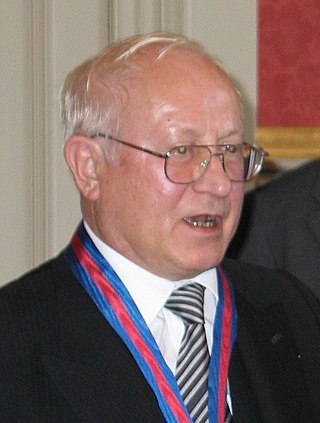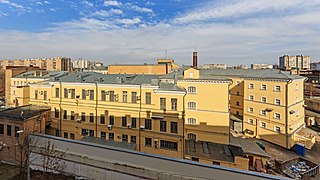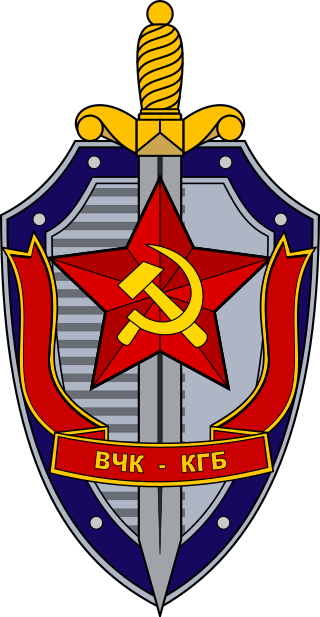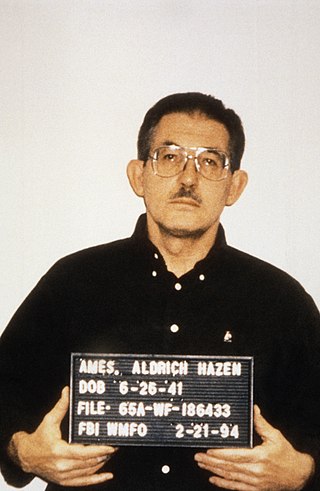Earl Edwin Pitts is a former FBI special agent who was convicted of espionage for selling information to Soviet and Russian intelligence services.

The Cambridge Five were a ring of spies in the United Kingdom that passed information to the Soviet Union during the Second World War and the Cold War and was active from the 1930s until at least the early 1950s. None of the known members were ever prosecuted for spying. The number and membership of the ring emerged slowly, from the 1950s onwards.

The Main Directorate of the General Staff of the Armed Forces of the Russian Federation, formerly the Main Intelligence Directorate, and still commonly known by its previous abbreviation GRU, is the foreign military intelligence agency of the General Staff of the Armed Forces of the Russian Federation. The GRU controls the military intelligence service and maintains its own special forces units.

Oleg Antonovich Gordievsky, CMG is a former colonel of the KGB who became KGB resident-designate (rezident) and bureau chief in London, and was a double agent, providing information to the British Secret Intelligence Service (MI6) from 1974 to 1985. After being recalled to Moscow under suspicion, he was exfiltrated from the Soviet Union in July 1985 under a plan code-named Operation Pimlico. The Soviet Union subsequently sentenced him to death in absentia.

Oleg Vladimirovich Penkovsky, codenamed Hero and Yoga was a Soviet military intelligence (GRU) colonel during the late 1950s and early 1960s. Penkovsky informed the United States and the United Kingdom about Soviet military secrets, most importantly, the appearance and footprint of Soviet intermediate-range ballistic missile installations and the weakness of the Soviet intercontinental ballistic missile program. This information was decisive in allowing the US to recognize that the Soviets were placing missiles in Cuba before most of them were operational. It also gave US President John F. Kennedy, during the Cuban Missile Crisis that followed, valuable information about Soviet weakness that allowed him to face down Soviet leader Nikita Khrushchev and resolve the crisis without a nuclear war.
Oleg Danilovich Kalugin is a former KGB general. He was during a time, head of KGB political operations in the United States and later a critic of the agency. After being convicted of spying for the West in absentia during a trial in Moscow, he remained in the US and was sworn in as a citizen on 4 August 2003.
As early as the 1920s, the Soviet Union, through its GRU, OGPU, NKVD, and KGB intelligence agencies, used Russian and foreign-born nationals, as well as Communists of American origin, to perform espionage activities in the United States, forming various spy rings. Particularly during the 1940s, some of these espionage networks had contact with various U.S. government agencies. These Soviet espionage networks illegally transmitted confidential information to Moscow, such as information on the development of the atomic bomb. Soviet spies also participated in propaganda and disinformation operations, known as active measures, and attempted to sabotage diplomatic relationships between the U.S. and its allies.
Adolf Georgiyevich Tolkachev was a Soviet electronics engineer who provided key documents to the United States Central Intelligence Agency (CIA) between 1979 and 1985. Working at the Soviet radar design bureau Phazotron as one of the chief designers, Tolkachev gave the CIA complete detailed information about projects such as the R-23, R-24, R-33, R-27, and R-60, S-300 missile systems; fighter-interceptor aircraft radars used on the MiG-29, MiG-31, and Su-27; and other avionics. He was executed as a spy in 1986.
William A. Englund is an American journalist and author. He has spent over four decades in the news business, most of those with The Baltimore Sun. He is currently with The Washington Post.

Lefortovo Prison is a prison in Moscow, Russia, which has been under the jurisdiction of the Russian Ministry of Justice since 2005.

Jack Foust Matlock Jr. is an American former ambassador, career Foreign Service Officer, a teacher, a historian, and a linguist. He was a specialist in Soviet affairs during some of the most tumultuous years of the Cold War, and served as the U.S. Ambassador to the Soviet Union from 1987 to 1991.

Bilateral relations exist and existed between Austria and Russia and their predecessor states. Since October 1955, the Republic of Austria maintains the constitutionally-mandated status of neutrality; the country is a founding member of the Organisation for Economic Co-operation and Development (OEEC). Austria joined the EU in 1995. Russia is a permanent member of the United Nations Security Council, a partner of ASEAN, a member of the Shanghai Cooperation Organisation (SCO), the G20, the Asia-Pacific Economic Cooperation (APEC), the Organization for Security and Co-operation in Europe (OSCE), as well as the leading member state of the Commonwealth of Independent States (CIS), the Collective Security Treaty Organization (CSTO), and the Eurasian Economic Union (EEU). Both countries are members of the Organization for Security and Co-operation in Europe and the World Trade Organization (WTO).
Gennadi Fyodorovich Zakharov was a Soviet physicist who worked for the United Nations who was arrested in a sting operation by the Federal Bureau of Investigation (FBI) in 1986.
The United States of America has conducted espionage against the Soviet Union and its successor state, the Russian Federation.

The Committee for State Security (CSS) was the main security agency for the Soviet Union from 13 March 1954 until 3 December 1991. As a direct successor of preceding agencies such as the Cheka, GPU, OGPU, NKGB, NKVD and MGB, it was attached to the Council of Ministers. It was the chief government agency of "union-republican jurisdiction", carrying out internal security, foreign intelligence, counter-intelligence and secret police functions. Similar agencies operated in each of the republics of the Soviet Union aside from the Russian SFSR, where the KGB was headquartered, with many associated ministries, state committees and state commissions.
The Illegals Program was a network of Russian sleeper agents under unofficial cover. An investigation by the Federal Bureau of Investigation (FBI) culminated in the arrest of ten agents on June 27, 2010, and a prisoner exchange between Russia and the United States on July 9, 2010.
Russian espionage in the United States has occurred since at least the Cold War, and likely well before. According to the United States government, by 2007 it had reached Cold War levels.

In 1995 it was revealed that the Central Intelligence Agency had delivered intelligence reports to the U.S. government between 1986 and 1994 which were based on agent reporting from confirmed or suspected Soviet operatives. From 1985 to his arrest in February 1994, CIA officer and KGB mole Aldrich Ames compromised Agency sources and operations in the Soviet Union and Eastern Europe, leading to the arrest of many CIA agents and the execution of at least ten of them. This allowed the KGB to replace the CIA agents with its own operatives or to force them to cooperate, and the double agents then funneled a mixture of disinformation and true material to U.S. intelligence. Although the CIA's Soviet-East European (SE) and Central Eurasian divisions knew or suspected the sources to be Soviet double agents, they nevertheless disseminated this "feed" material within the government. Some of these intelligence reports even reached Presidents Ronald Reagan and George H. W. Bush, as well as President-elect Bill Clinton.
Sexpionage is the involvement of sexual activity, or the possibility of sexual activity, intimacy, romance, or seduction to conduct espionage. Sex or the possibility of sex can function as a distraction, incentive, cover story, or unintended part of any intelligence operation.
In the context of the Russo-Ukrainian War, in the time leading up to and after the 2022 Russian invasion of Ukraine, a number of citizens of the Russian Federation and of other nationalities working for Russia have been identified publicly as spies or agents of the Federal Security Service (FSB), the Russia's foreign intelligence service (SVR) or the third intelligence arm, the military intelligence service (GRU). Each arm having their own remits.









